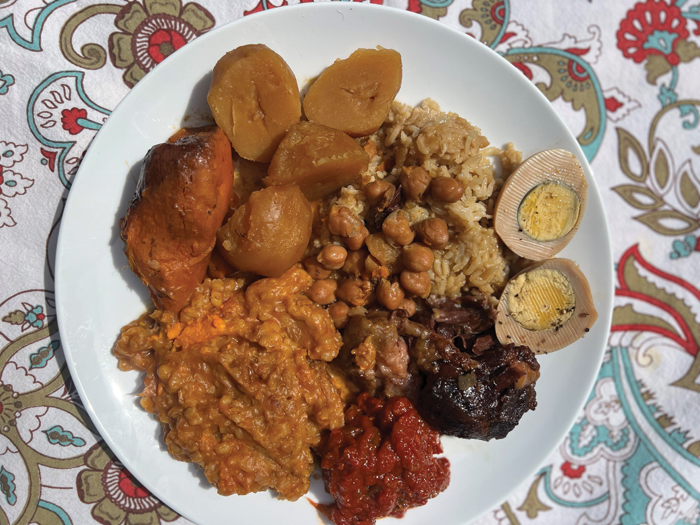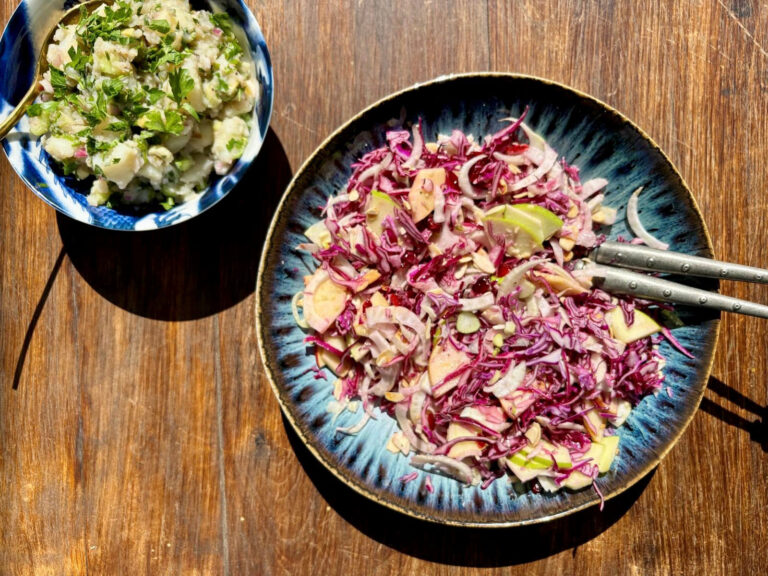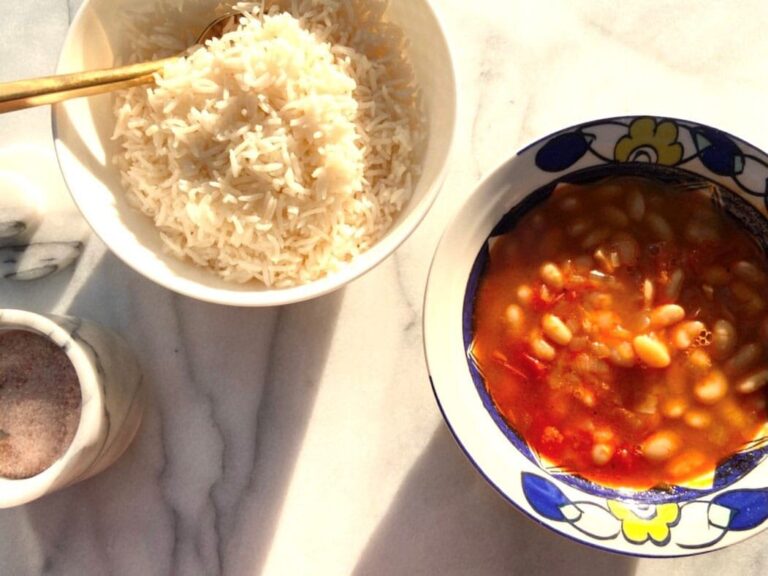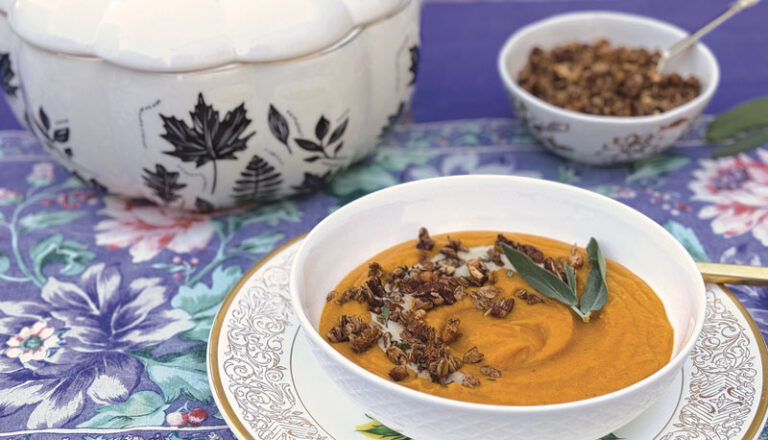The Delights of Dafina
If you grew up in a Moroccan household, you know that Shabbat lunch is dafina.
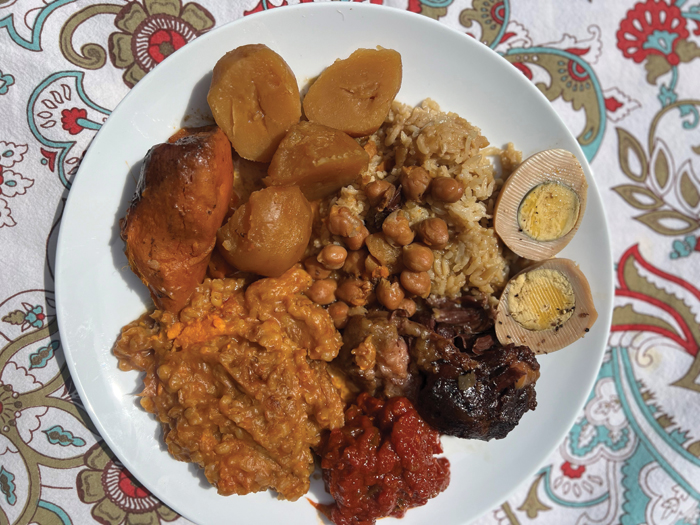
Moroccan tradition dictates that the first daughter is named after her paternal grandmother. So when I was born in Casablanca, my name was no surprise. I was named Raquel after my father’s mother. In a sad twist of fate, my grandmother passed away on the day that I was born. And for that reason, I don’t know that much about her.
If you grew up in a Moroccan household, you know that Shabbat lunch is dafina. Winter, spring, summer and fall, dafina is non-negotiable. A big pot of this delicious stew is the source of a mouthwatering mound of moist fatty meat, glistening marrow bones, earthy chickpeas, browned potatoes and creamy, caramelized sweet potatoes. Then there are the extras that are added to the pot in little cheesecloth bags or cooked separately—Orisa (wheat-berries flavored with chopped garlic, smoky paprika and a small, spicy kick of harissa or chili powder) and rice infused with saffron or turmeric.
Of course, the star of every Sephardic hamin (Shabbat stew) are the “huevos hamina- dos,” Ladino for the delicious whole, roasted brown eggs that sit in the pot cooking slowly overnight.
This past Shabbat, I was blessed to host my father, my uncle Albert, my brothers and my cousins for lunch. On Friday, I slowly simmered a spicy Moroccan fish dish with lots of colored peppers, carrots and harissa.
While everyone was enjoying the first course, I went to the kitchen to plate the dafina. Unlike cholent, which can be served out of the pot, all the components of the dafina are plated separately — one platter with all the meat and bones, and bowls for the potatoes, the rice, the wheat, the garbanzos and broth in a bowl together and one with the eggs.
Now that I have an empty nest, I don’t entertain like I used to. We always host a Friday night dinner with our children and family, but Saturdays have really become my day of rest.
For most Moroccans, dafina is a very nostalgic dish. The conversation always turns to stories and memories of the past.
When I do host lunch, it’s special to share a meal that means so much to all of us. For most Moroccans, dafina is a very nostalgic dish. The conversation always turns to stories and memories of the past.
This Shabbat, I asked my uncle Albert if my grandmother Raquel used to make dafina. He looked at me as though I were crazy. Of course she made it. Everyone made it.
My grandmother was born in Tetouan and when she married my grandfather Salomon, she moved to Larache. He was the proprietor of a spice shop (not for nothing I’m a spice girl!). He came from a large, close knit family and had four brothers and two sisters. Albert told me that on many Shabbat afternoons, his mother and aunts would sit drinking tea together, while the men slept off the dafina.
Albert and my father reminisced about carrying their mother’s dafina to the communal oven. She always made sure that her pot was clearly marked, so that they would be sure to get their dafina back. The whole time they lived in Morocco, they never had a refrigerator. They used to store food on the window ledge and in the garden.
My grandmother always cooked over charcoal, buying bags of charcoal every few weeks and storing it in the basement. Anything that needed to cook in the oven would be sent to the communal oven. In the summer, food was cooked and consumed. That made me laugh. I said “Oh, that’s why my father will never eat leftovers!”
In 1961, like many Moroccan Jews before them, my grandparents decided to make Aliyah to Israel. In 1956, with the return of Mohammed V and the declaration of Morocco’s independence, the Jews were granted Moroccan citizenship, but with fewer rights compared to their Moslem neighbors. In 1959, because of pressure from the Arab League, Jews were prohibited from emigrating to Israel. So immigration happened clandestinely through an underground Jewish organization in Morocco. They often traveled through Spain and France to get to Israel. My grand-parents and Albert sailed by boat to Marseille, France. They arrived in Haifa in the middle of the night and were sent to old apartments set aside for immigrants, where there were only mattresses on the floor. Luckily, the next day my uncle Rafael took my grandparents to his Haifa apartment. Rafael had done military service in Spain. In 1956, he had emigrated to Israel, arriving just in time to fight in the Sinai campaign.
My grandparents had a hard time adjusting to life in a strange land. They had no friends, but they had three of their four sons there. The family was growing with the birth of grandchildren. My poor grandmother had many health issues and died four years after their arrival in Israel. My grandfather slowly
grew accustomed to life in Israel. He lived a long life, surrounded by his many well educated, successful, Hebrew-speaking grandchildren. He passed away knowing that he was at home in Israel.
The next time you gather with your family, take advantage of these precious moments, and ask questions. I am slowly piecing together a history I knew nothing about. Every generation has their unique story.
—Rachel
Jewish overnight stews — dafina, cholent, t’bit — were an ingenious way to solve the challenge of serving hot, delicious food on Shabbat without breaking the prohibition against cooking on the Sabbath. Dafina is a truly scrumptious layering of hearty ingredients that are sweetened with dates and seasoned with cumin and cinnamon. The long, slow cooking process results in a delightfully nuanced smoky, caramelized flavor.
It’s a dish that requires a talent for arranging, more than any particular culinary skills. The efforts are more than repaid in a delicious dish that will feed a large crowd.
Bringing family and friends together for wonderful meals is truly one of the greatest joys in life.
—Sharon
RACHEL’S DAFINA
1 16 ounce bag garbanzo beans, soaked overnight
1 whole head of garlic, unpeeled with top cut off
2 pounds boneless cheek meat (any fatty meat will work)
3-4 marrow bones (optional)
12 small red potatoes, washed
2 large sweet potatoes, peeled & halved 1 large onion, peeled and halved
2 pitted dates
1 Tbsp honey
Salt and pepper
Olive oil
Water
1 dozen eggs, rinsed
Assemble:
• In a large pot or crock pot, place the garbanzos, garlic, meat, potatoes, sweet potato, onion, dates and honey.
• Season well with salt, pepper and a driz- zle of olive oil.
• Add water to cover the ingredients up to top of the pot.
• Over medium heat, cook on high for two hours then set on low for 12 hours or more.
ORISA — Served alongside Dafina
1/2 cup of olive oil
2 large onions,chopped
2 large sweet potatoes, cut in large pieces 1 large head garlic, whole and unpeeled
1 Tbsp paprika
1 tsp pepper
1 tsp cumin
2 chicken bouillon cubes
Cayenne pepper or harissa, to taste
(optional)
4 cups of water
2 cups wheat berries or regular wheat, soaked overnight
• In a small pot or crockpot, heat olive oil over medium heat. Add onions and sauté until golden.
• Add sweet potato, garlic, spices and cayenne or harissa and stir well.
• Add 4 cups of water and wheat berries and bring to a boil.
• Lower heat, cover and cook for one hour.
• Transfer to crockpot set to low or on a hot plate or in a low oven, next to the dafina.
RICE
2 cups rinsed long grain rice
1 Tbsp oil
6 threads saffron or 1 tsp turmeric
Mix in a bowl
Place in cheesecloth or cloth bag Place on top of potatoes in dafina. Layer eggs on top.
Sharon Gomperts and Rachel Emquies Sheff have been friends since high school. The Sephardic Spice Girls project has grown from their collaboration on events for the Sephardic Educational Center in Jerusalem. Follow them on Instagram @sephardicspicegirls and on Facebook at Sephardic Spice SEC Food.

